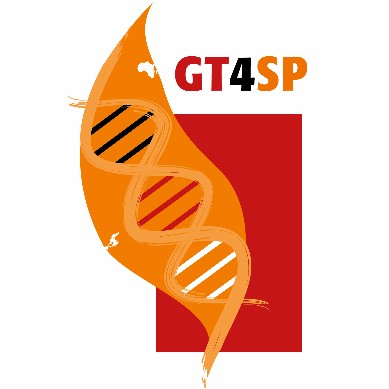Sweetpotato Genomics Resource
August 8, 2025: The paper "Phased chromosome-level assembly provides insight into the genome architecture of hexaploid sweetpotato" has been published in Nature Plants. All of the sweetpotato genome assemblies and annotation on the Sweetpotato Genomics Resource are now publicly available without restriction.
Sweetpotato (Ipomoea batatas) is an important food crop throughout the world and especially in developing countries due to its caloric and nutritional benefits. Efforts to improve breeding of sweetpotato for traits important to small farmers can be accelerated through the use of genomics-assisted (genomics-guided) breeding. The sweetpotato genome is large and complex due to its ploidy (hexaploid) and heterozygosity. Thus, to facilitate genome-enabled breeding in hexaploid sweetpotato, participants in the Bill & Melinda Gates Foundation-funded Genomic Tools for Sweetpotato Improvement project have generated the sequence for two diploid, highly inbred Ipomoea species: Ipomoea trifida (NSP306) and Ipomoea triloba (NSP323) to serve as a reference sequence for the hexaploid sweetpotato genome.
The two genomes were first repeat masked then annotated for protein-coding genes using a set of transcript and protein evidence. The Ipomoea trifida (NSP306) assembly is 462 Mb with 32,301 annotated high confidence gene models whereas the Ipomoea triloba (NSP323) assembly is 458 Mb with 31,426 annotated high confidence gene models. The Sweetpotato Genomics Resource contains a set of search and query tools including a BLAST server, genome browsers for these two reference genomes, and gene report pages for all annotated genes in the two species. Also included on both the genome browsers and in the gene report pages are sequence polymorphisms identified by aligning whole genome shotgun and RNA-sequencing reads from hexaploid sweetpotato to both Ipomoea reference genomes.
Quick Search
What's New
August 8, 2025: The paper "Phased chromosome-level assembly provides insight into the genome architecture of hexaploid sweetpotato" has been published in Nature Plants. All of the sweetpotato genome assemblies and annotation on the Sweetpotato Genomics Resource are now publicly available without restriction.
November 20, 2024: The SweetGAINS Project is pleased to make available the haplotype-resolved chromosome-scale genome assembly and annotation of I. batatas Beauregard (v4) and I. batatas New Kawogo (v3) under a pre-publication data release policy. New consensus assemblies for I. batatas Beauregard and I. batatas New Kawogo are also available under a pre-publication data release policy.
August 21, 2024: The SweetGAINS Project is pleased to make publicly available the updated haplotype-resolved chromosome-scale genome assembly and annotation of I. batatas Tanzania (v3) and a new consensus chromosome-scale genome assembly and annotation of I. batatas Tanzania (v1). Please see the preprint Phased chromosome-level genome assembly provides insight into the origin of hexaploid sweetpotato for more information.
Maintenance Notice
Web pages may be unavailable or only partially functional during server maintenance, which is planned for the first Wednesday of every month.

